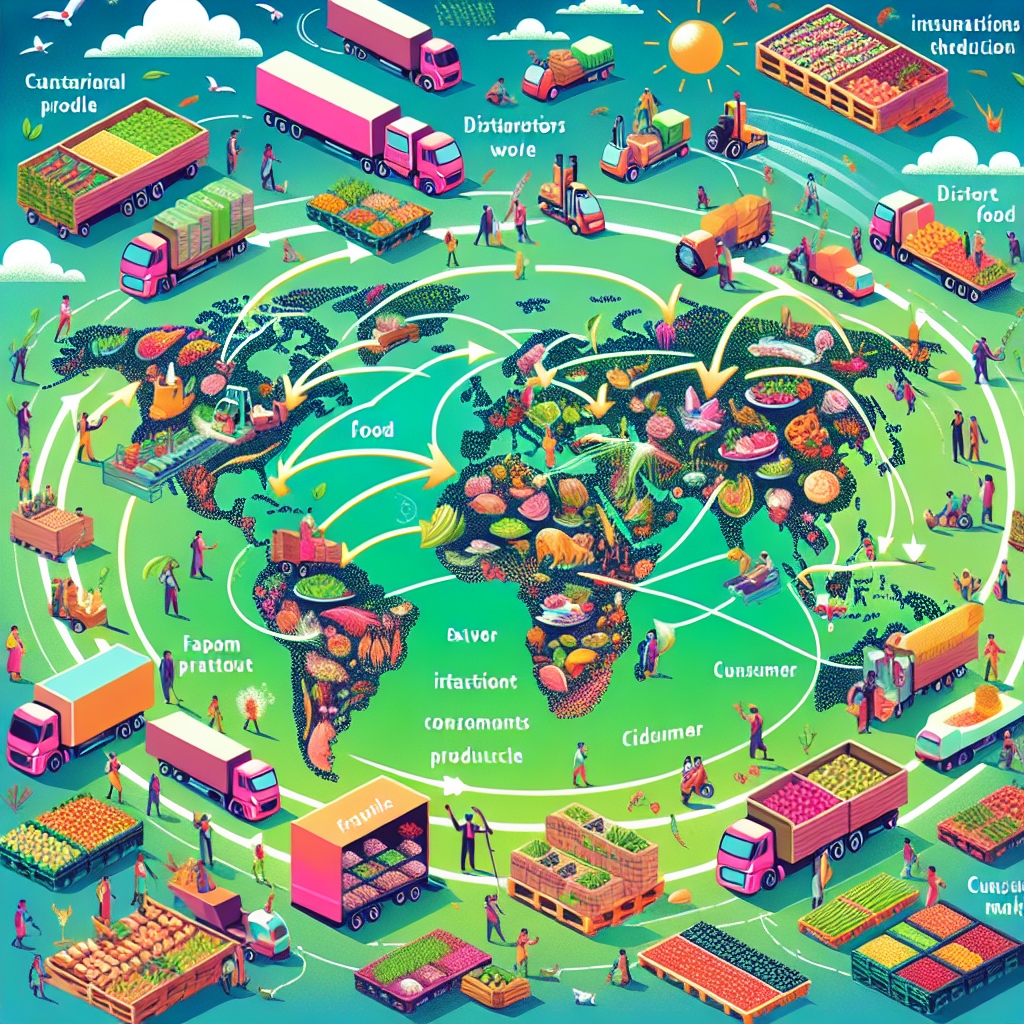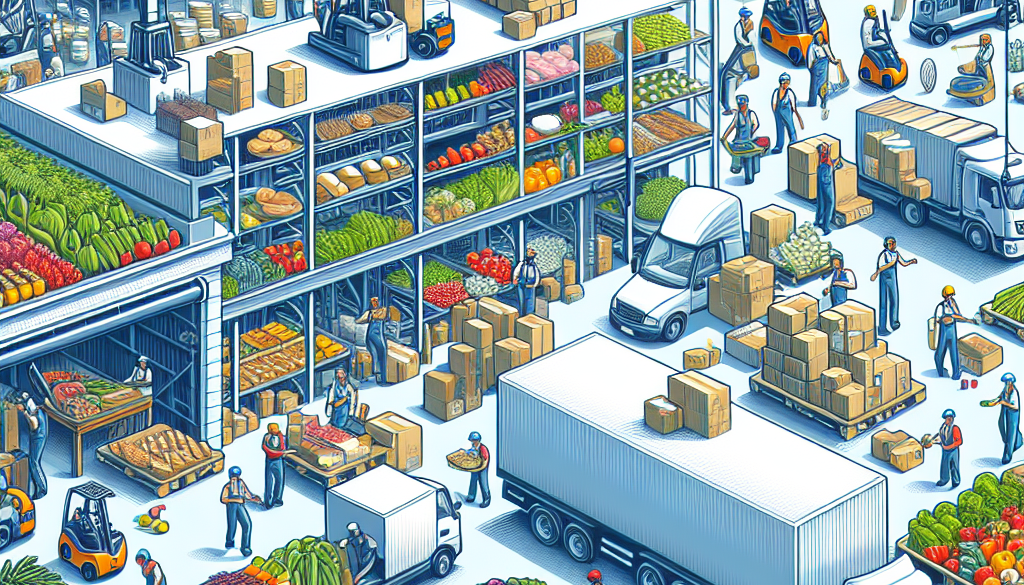The Vital Role of Food Distributors in the Food Market Ecosystem
-
Table of Contents
- Food Distributors: The Unsung Heroes of the Food Market Ecosystem
- The Essential Functions of Food Distributors
- Connecting Producers with Retailers and Consumers
- Statistics Highlighting the Impact of Food Distributors
- Challenges Faced by Food Distributors
- Technological Innovations in Food Distribution
- The Future of Food Distribution
- Conclusion
- ETprotein: Your Trusted Source for High-Quality Protein Products
Food Distributors: The Unsung Heroes of the Food Market Ecosystem

The food market ecosystem is a complex web of producers, processors, distributors, retailers, and consumers. Each player in this system has a crucial role to play, ensuring that food products move from farms to forks efficiently and safely. Among these players, food distributors are often the unsung heroes, acting as the vital link between the production and consumption of food. In this article, we will delve into the pivotal role that food distributors play in the food market ecosystem, highlighting their importance and the challenges they face.
The Essential Functions of Food Distributors
Food distributors serve as the middlemen in the food supply chain, performing several key functions that keep the food market running smoothly:
- Logistics and Transportation: Distributors manage the complex logistics of transporting food from producers to various retail outlets, including grocery stores, restaurants, and schools.
- Inventory Management: They maintain appropriate levels of stock to meet the demand, ensuring a consistent supply of food products.
- Quality Control: Distributors are responsible for maintaining the quality and safety of food products during transit and storage.
- Market Expansion: By reaching different geographical areas, distributors help producers expand their market presence.
- Value-Added Services: Many distributors offer additional services such as ripening, packaging, and branding to enhance product appeal.
Connecting Producers with Retailers and Consumers
Food distributors play a critical role in connecting producers with retailers and ultimately consumers. They ensure that a diverse array of food products is available in the market, catering to the varied tastes and dietary needs of the population. By doing so, they help to stabilize food prices and contribute to the economic viability of the food industry.
Statistics Highlighting the Impact of Food Distributors
According to a report by the Food Industry Association, the food wholesale distribution industry in the United States alone accounts for approximately 15% of all food sales, with an estimated annual revenue of over $600 billion. This underscores the significant economic impact that food distributors have within the food market ecosystem.
Challenges Faced by Food Distributors
Despite their importance, food distributors face several challenges that can affect their efficiency and profitability:
- Regulatory Compliance: Distributors must navigate a complex web of food safety regulations, which can vary by region and product type.
- Supply Chain Disruptions: Events such as natural disasters, pandemics, or political unrest can disrupt supply chains, making it difficult for distributors to fulfill their role.
- Technological Advancements: Keeping up with the latest technology in logistics and inventory management requires significant investment.
- Consumer Demand: Changing consumer preferences and demand for fresher, locally-sourced foods can pose logistical challenges.
Technological Innovations in Food Distribution
Technological advancements are helping food distributors overcome some of these challenges. Innovations such as blockchain for traceability, AI for demand forecasting, and IoT for real-time monitoring of food safety are transforming the industry. These technologies enable distributors to be more efficient, transparent, and responsive to market demands.
The Future of Food Distribution
The future of food distribution is likely to see increased consolidation, with larger distributors acquiring smaller ones to expand their reach and capabilities. Additionally, sustainability will become a more significant factor, with distributors seeking to reduce their carbon footprint through optimized routing, energy-efficient warehouses, and alternative fuel vehicles.
Conclusion
In conclusion, food distributors are an indispensable part of the food market ecosystem. They ensure the smooth flow of food products from producers to consumers, overcoming logistical challenges and adapting to market changes. As the industry evolves, distributors will continue to innovate and improve their operations to meet the growing demands of the global food market.
ETprotein: Your Trusted Source for High-Quality Protein Products
In light of the importance of food distributors in the food market ecosystem, it’s essential to recognize companies like ETprotein that contribute to the industry’s success. ETprotein offers a wide range of high-quality protein products that are essential for various sectors within the food and beverage industry.
ETprotein’s protein products, including organic rice protein, pea protein, and various seed proteins, are characterized by their neutral taste, non-GMO, and allergen-free attributes. With L-(+)-Ergothioneine purity over 98%, ETprotein caters to nutraceutical, pharmaceutical, cosmeceutical, veterinary, and food and beverage industries worldwide.
For businesses looking to source reliable and high-quality protein products, ETprotein stands out as a reputable supplier. Their commitment to excellence and customer satisfaction makes them a valuable partner in the food distribution network.
About ETprotein:
ETprotein, a reputable protein and L-(+)-Ergothioneine (EGT) Chinese factory manufacturer and supplier, is renowned for producing, stocking, exporting, and delivering the highest quality organic bulk vegan proteins and L-(+)-Ergothioneine. They include Organic rice protein, clear rice protein, pea protein, clear pea protein, watermelon seed protein, pumpkin seed protein, sunflower seed protein, mung bean protein, peanut protein, and L-(+)-Ergothioneine EGT Pharmaceutical grade, L-(+)-Ergothioneine EGT food grade, L-(+)-Ergothioneine EGT cosmetic grade, L-(+)-Ergothioneine EGT reference grade and L-(+)-Ergothioneine EGT standard. Their offerings, characterized by a neutral taste, non-GMO, allergen-free attributes, with L-(+)-Ergothioneine purity over 98%, 99%, cater to a diverse range of industries. They serve nutraceutical, pharmaceutical, cosmeceutical, veterinary, as well as food and beverage finished product distributors, traders, and manufacturers across Europe, USA, Canada, Australia, Thailand, Japan, Korea, Brazil, and Chile, among others.
ETprotein specialization includes exporting and delivering tailor-made protein powder and finished nutritional supplements. Their extensive product range covers sectors like Food and Beverage, Sports Nutrition, Weight Management, Dietary Supplements, Health and Wellness Products, and Infant Formula, ensuring comprehensive solutions to meet all your protein needs.
As a trusted company by leading global food and beverage brands and Fortune 500 companies, ETprotein reinforces China’s reputation in the global arena. For more information or to sample their products, please contact them and email sales(at)ETprotein.com today.














